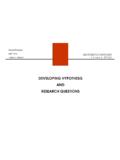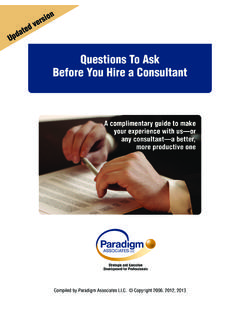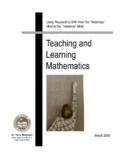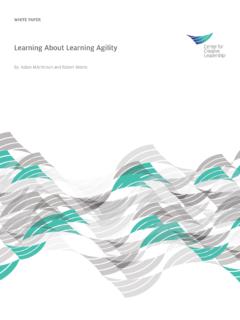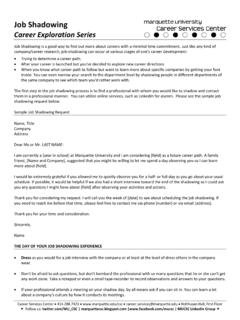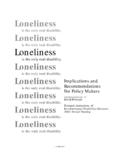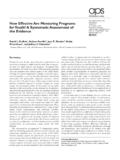Transcription of Mindfulness as an Attuned Relationship with Oneself
1 Reflections on The Mindful Brain A Brief Overview Adapted from The Mindful Brain: Reflection and Attunement in the Cultivation of Well-Being (New York: WW Norton 2007). Daniel J. Siegel, Welcome to a journey into the heart of our lives. Being mindfully aware, attending to the richness of our experiences, creates scientifically recognized enhancements in our physiology, our mental functions, and our interpersonal relationships. Being fully present in our awareness opens our lives to new possibilities of well-being. Almost all cultures have a form of practice to help develop awareness of the moment. The major religions of the world utilize some form of focusing one's attention, from meditation to prayer, yoga to Tai' chi.
2 Each of these traditions may have its own particular approach, but they share in common the power of intentionally focusing awareness in a way that transforms people's lives. Why is this mindful awareness so universal an ideal goal across our human family? Can we find a common thread that links these practices that might help us understand the power of this way of being to enhance health, relationships, and well-being? Mindfulness as an Attuned Relationship with Oneself Although Mindfulness is often seen as a form of attentional skill that focuses your mind on the present, the approach of The Mindful Brain takes a deep look at this type of awareness through a perhaps surprising perspective: seeing Mindfulness as a form of healthy Relationship with Oneself .
3 In my own field of studying interpersonal relationships within families, we use the concept of attunement to examine how one person, a parent for example, focuses attention on the internal world of another, such as a child or a spouse. This focus on the mind of another person harnesses neural circuitry that enables two people to feel felt by each other. This state is crucial for people in relationships to feel vibrant and alive, to feel understood, and to feel at peace. Research has shown that such Attuned relationships promote resilience and longevity. Our understanding of Mindfulness can build on these studies of interpersonal attunement and the self-regulatory functions of attention in suggesting a new approach: That mindful awareness is a form of intra-personal attunement.
4 Being mindful is a way of becoming your own best friend. We'll explore how the process of attunement may lead the brain to grow in ways that promote balanced self-regulation and a process called neural integration that enables flexibility and self-understanding. This way of feeling felt, of feeling connected in the world, may help us understand how becoming Attuned to Oneself may promote these physical and psychological dimensions of well-being with mindful awareness. Turning to the brain can help us see the commonality of mechanisms between these two forms of internal and interpersonal attunement. By examining the neural dimension of functioning and its possible correlation with mindful awareness, we may be able to expand our understanding of why and how Mindfulness creates the documented improvements in immune function, inner sense of well-being, and our capacity for rewarding interpersonal relationships.
5 The Need We are in desperate need for a new way of being in our selves, in our schools, and in our society. Our modern culture has evolved in recent times to create a troubled world with individuals suffering from alienation, schools failing to inspire and to connect with children, a modern society without a moral compass helping clarify how we can move forward in our global community. I have seen my own children grow in a world more and more distant from human interactions that our brains have evolved to require yet are not a part of our inherent educational and social systems. The human connections that help shape our neural connections are sorely missing in modern life.
6 We are not only losing our opportunities to attune to each other, but the hectic lives many of us live leave little time for attuning to ourselves. As a physician, psychiatrist, psychotherapist and educator, I've been saddened and dismayed to find so absent from our work as clinicians a firm grounding in the healthy mind itself. After asking over seventy four thousand mental health professionals face-to-face in lecture halls around the world if they'd ever had a course on the mind, or on mental health, ninety-five percent replied no. What then have we been practicing? Isn't it time for us to become aware of the mind itself, not just to highlight symptoms of illness?
7 Cultivating an experiential understanding of the mind is a direct focus of mindful awareness: We come to not only know the mind, but to embrace our own inner world and the mind of others with kindness and compassion. The human potential for compassion and empathy is huge. Realizing that potential may be challenging in these troubled times, but perhaps it may be as direct as attuning to ourselves, one mind, one Relationship , one moment at a time. Interpersonal Neurobiology Understanding the deep nature of how our relationships help shape our lives and our brains has been a passion driving my professional life. Over the last fifteen years I have been involved in trying to create an interdisciplinary view of the mind and mental health (see Siegel, 1999, 2001, 2003, 2006).
8 The perspective of interpersonal neurobiology embraces a wide array of ways of knowing, from the broad spectrum of scientific disciplines to the expressive arts and contemplative practice. Interpersonal neurobiology relies on a process of integrating knowledge from a variety of disciplines to find the common features that are shared by these independent fields of knowledge. Much like the old Indian fable of the blind men and the elephant, each discipline examines a necessarily focused area of the elephant, of reality, in order to know that dimension deeply and with detail. But to see the whole picture, to get a feeling for the whole elephant, it is vital that we try to bring different fields together.
9 While each blind man may not agree with the perspective of the other, each has important contributions to creating a sense of the whole. And so we will be using this integrative approach to bring together various ways of knowing to understand Mindfulness in perhaps a broader way than any single perspective might permit. At the foundation we will be trying to combine first person knowing with scientific points of view. Beyond this important subjective/objective marriage, we'll be combining insights from the field of neuroscience with those of the fields of attachment research to consider how the fundamental process of attunement might be at work in the brain in states of interpersonal communication and the proposed form of intra-personal attunement of Mindfulness .
10 Turning to the brain and attachment studies is not meant to favor these two fields over any other. This will be a starting point in our journey. As you'll see, a variety of fields will come into play as we examine the research on memory, narrative, wisdom, emotion, perception, attention, and learning along with explorations that go deeply into internal subjective experience. Reflections on The Mindful Brain Copyright (C) 2007 Mind Your Brain, Inc. Daniel J. Siegel, 2. An Invitation Mindful awareness requires that we dive deeply into the inner nature of the mind, to sense our experiences with a sometimes new set of lenses. Studying Mindfulness as a useful and fascinating human process enTails that we blend personal immersion and scientific thought.
